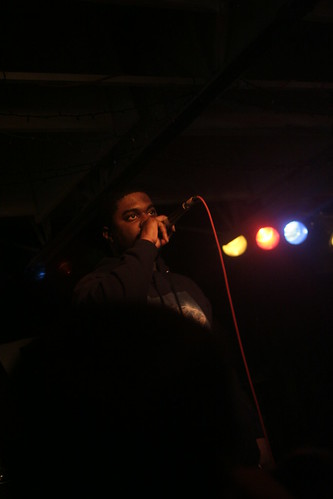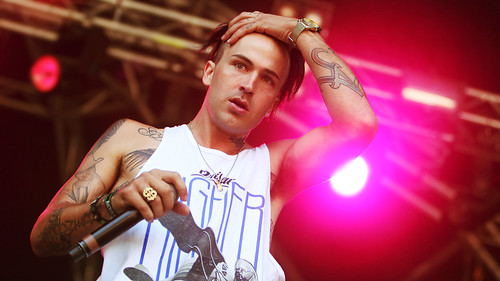Metal Lungies Hollers @ Comedy Central’s Drunk History, Interview.
Outside of the Cinema Tent at Bonnaroo, director Jeremy Konner sat down with us, burger in hand, to discuss Season Two of Comedy Central’s Drunk History which debuts July 1st at 10 P.M.
What are your plans for Bonnaroo?
We’re doing this live thing, showing clips from our new season, that [co-creator] Derek [Waters] will be hosting. We’re really excited because this season is good, man, I am thrilled about it. Drunk History is fun because as a director I feel like I’m allowed to say shit like that because the narrators are really the ones that are doing everything. The stories that they’re telling and the way they’re telling things is so good that I feel like that it’s ok that I get to be like “wait until you see [Jen] Kirkman’s Edith Wilson story”.
I know the Detroit episode was one of your favorites during Season One. Going into Season Two, is the Edith Wilson story your favorite?
Ugh, I LOVE the First Ladies episode. I think Jen Kirkman is the queen of Drunk History at this point. Molly McAleer is telling a story about Francis Cleveland, which is so funny, and then Jenny Johnson tells a story of Dolly Madison saving the fucking White House. It’s so good! Casey Wilson plays her and I mean… it’s the story that the White House is burning and she’s saving fucking George Washington and the Declaration of Independence!
It sounds like you’re changing the format a bit this season.
Just a tiny bit. Last season the Wild West was our only themed episode. We had these stories that you just couldn’t smash into a city because so many of them are a little funky when you sit back and think about it. Like… wait, Detroit is Houdini? He never lived there but he did die there. Actually, he got punched in Montreal, I think, and then he ended up in Detroit where he finally died but it’s really tough to call that a Detroit story. I don’t think that’s an issue to me, honestly, he died in Detroit so it fucking happened in Detroit. But the themed [episodes] really open things up.
Have you had any sort of fact-checker fans jump in with comments on the show?
Absolutely! We get that all the time. Not trying to be a braggart but we get historians being like “Yeah man, that actually did happen, they told the truth!”. Usually we’re going off of the most recently believed thing and we don’t do too many topics that are controversial. We do have a staff of fact checkers, if the narrator says the date and it’s wrong then we just don’t have them say it and we put the real date up on the screen.
You know, we’re not trying to tell wrong history, we’re trying to tell drunk history.
When you have [a narrator] saying “Lincoln was like ‘fuck you’” it’s actually pretty historically accurate. Yes, it was like a 30 page speech but essentially it was a ‘fuck you’.
Is there anything from Season One that didn’t air?
We had some [stories] that were about murderers that we couldn’t quite figure out how to make funny. We filmed somebody talking about H.H. Holmes from the Chicago World’s Fair who was just super grisly. We toyed around with the idea of putting that into a Halloween episode and making it really campy to try and lighten it up a bit. But, yeah, we’ve found that when there are stories that are just a little too real and end with very little hope… it’s hard.
So, these unaired bits, are these the same narrators that have done other stories? How many stories does one narrator typically tell you?
In Season One we were really figuring out what the show was and how we were going to do it. How it was going to translate from web series to television. We thought at first that we were just going to focus on quantity. We were having every narrator come to us with, or learn, two stories. Each would take about three hours [to film] and then we would film two narrators in a night which meant physically going to two people’s houses.
That’s a grind.
Yeah, we would end up going to bed at like 5 AM and the crew was just in pain. Derek, while he’s not getting wasted, he’s drinking with the narrators… it’s part of the camaraderie and nature of the show. So, we realized we couldn’t keep doing this. In Season Two we were much smarter about honing in on one story that we’re going to tell. We have one thing to do today and that’s to get this story from this person no matter what. If they don’t know a part of the story, we will sit with them and learn it. We’re not going to walk away having half a story.
Last thing, you’ve had musicians as narrators in the past, are there any rappers in Season Two?
I would love to have some rappers on the show. I’d be lying if I said we didn’t approach some rappers this season. Depending on time in the show we do today we might be showing the story of ‘Rapper’s Delight’ that we shot for our American Music episode [in Season Two]. Which will be very cool.
Check out Season Two of Drunk History, airing on Comedy Central, on July 1st, 2014 at 10 P.M.
Sphere: Related Content









